When it comes to kitchen design, quartz countertops are one of the most popular and versatile options available today. Quartz is an engineered stone that combines natural quartz with resins, pigments, and other materials to create a highly durable, non-porous surface that is ideal for kitchen countertops. Unlike natural stones like granite or marble, quartz offers the advantage of being low-maintenance while still providing the luxurious appearance that homeowners seek. The wide variety of colors, patterns, and finishes available in quartz makes it suitable for virtually any kitchen style, from modern and sleek to traditional and rustic.
One of the major reasons homeowners love quartz countertops is the fact that they are highly durable. Quartz is one of the hardest minerals found in nature, making it incredibly resistant to scratches, chips, and cracks. This makes it a great choice for busy kitchens where cooking, chopping, and meal preparation are daily activities. Even though quartz is durable, it’s always a good idea to use cutting boards and trivets to protect the surface, as extreme force or heat can still cause damage over time.
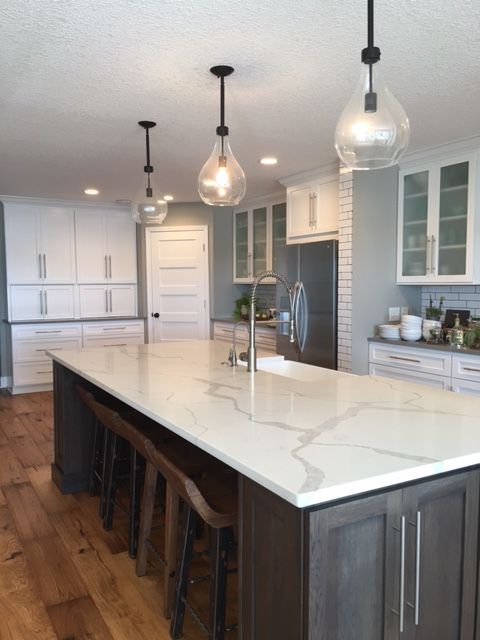
The non-porous nature of quartz is another big selling point. Unlike natural stones like granite, which have to be sealed to protect against stains, quartz countertops are non-porous and inherently resistant to spills and stains. This makes them easy to clean and maintain, as liquids like wine, oil, and coffee won’t penetrate the surface. With just a gentle wipe using mild soap and water, quartz countertops can be kept looking clean and fresh for years.
One of the most exciting aspects of quartz countertops is the sheer variety of design options available. Quartz comes in a wide range of colors, from classic white and black to more adventurous hues like bold blues, greens, and even metallic finishes. Homeowners can choose patterns that mimic the natural veining of marble or opt for a more consistent, uniform appearance that works well in minimalist or modern kitchens. The ability to customize the look of quartz makes it a go-to material for those looking to create a unique and personalized kitchen.
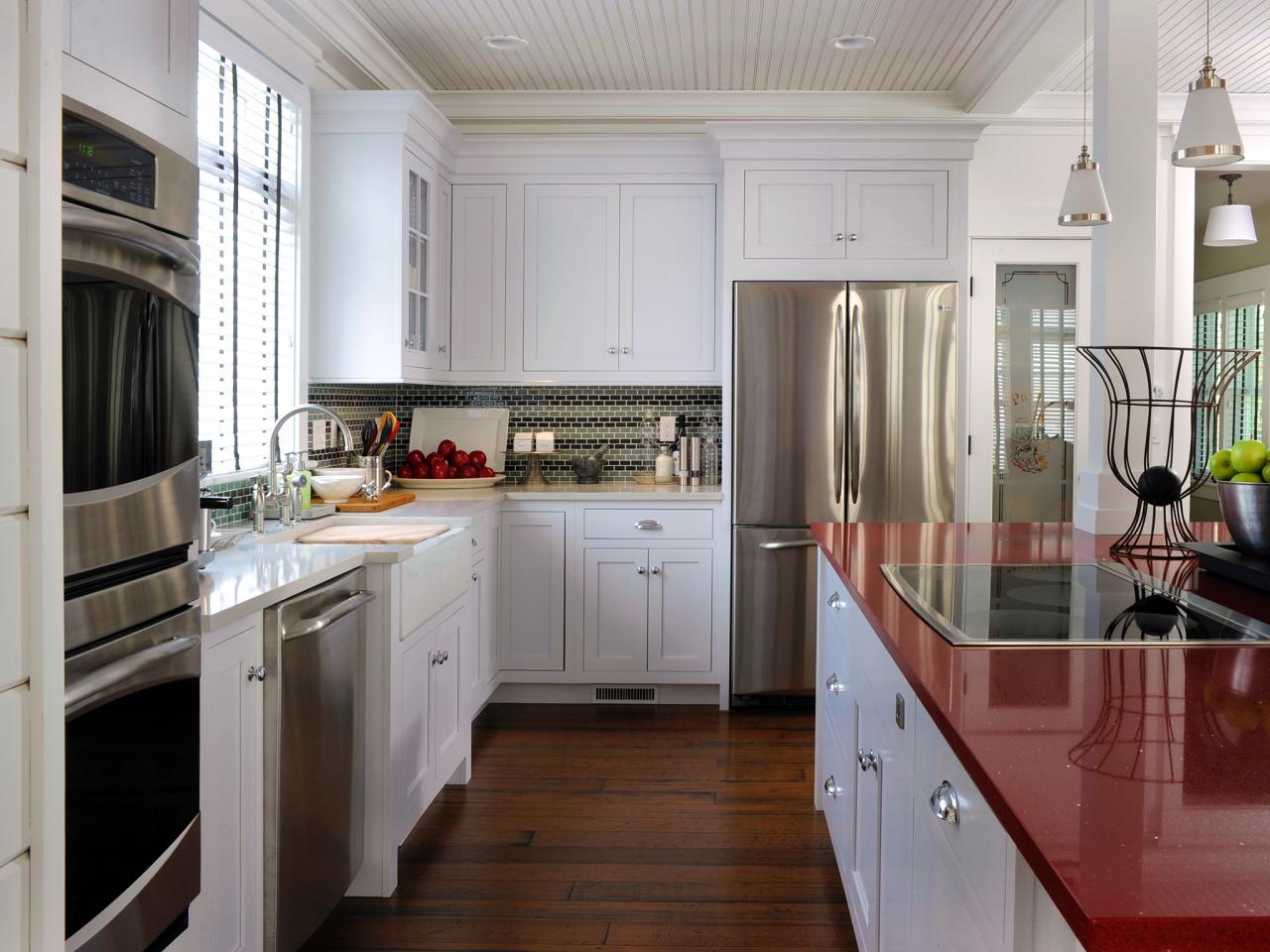
Another advantage of quartz countertops is their ability to complement a variety of kitchen design styles. For a contemporary kitchen, a sleek, polished quartz countertop in a neutral tone like white or grey can create a clean, streamlined look. If you’re going for a more rustic or farmhouse feel, there are quartz designs that mimic the natural veining and texture of stones like marble or soapstone, providing a warm, organic vibe. The versatility of quartz means it can work in any kitchen style, whether it’s modern, traditional, transitional, or somewhere in between.
One popular trend in quartz countertops is the use of waterfall edges. This design involves extending the countertop material down the sides of the cabinetry, creating a seamless flow from the surface to the floor. Waterfall edges provide a dramatic and luxurious look, especially when paired with bold quartz patterns or colors. They are often used in kitchen islands as a focal point, drawing attention to the beauty of the quartz while also providing additional protection to the sides of the island.
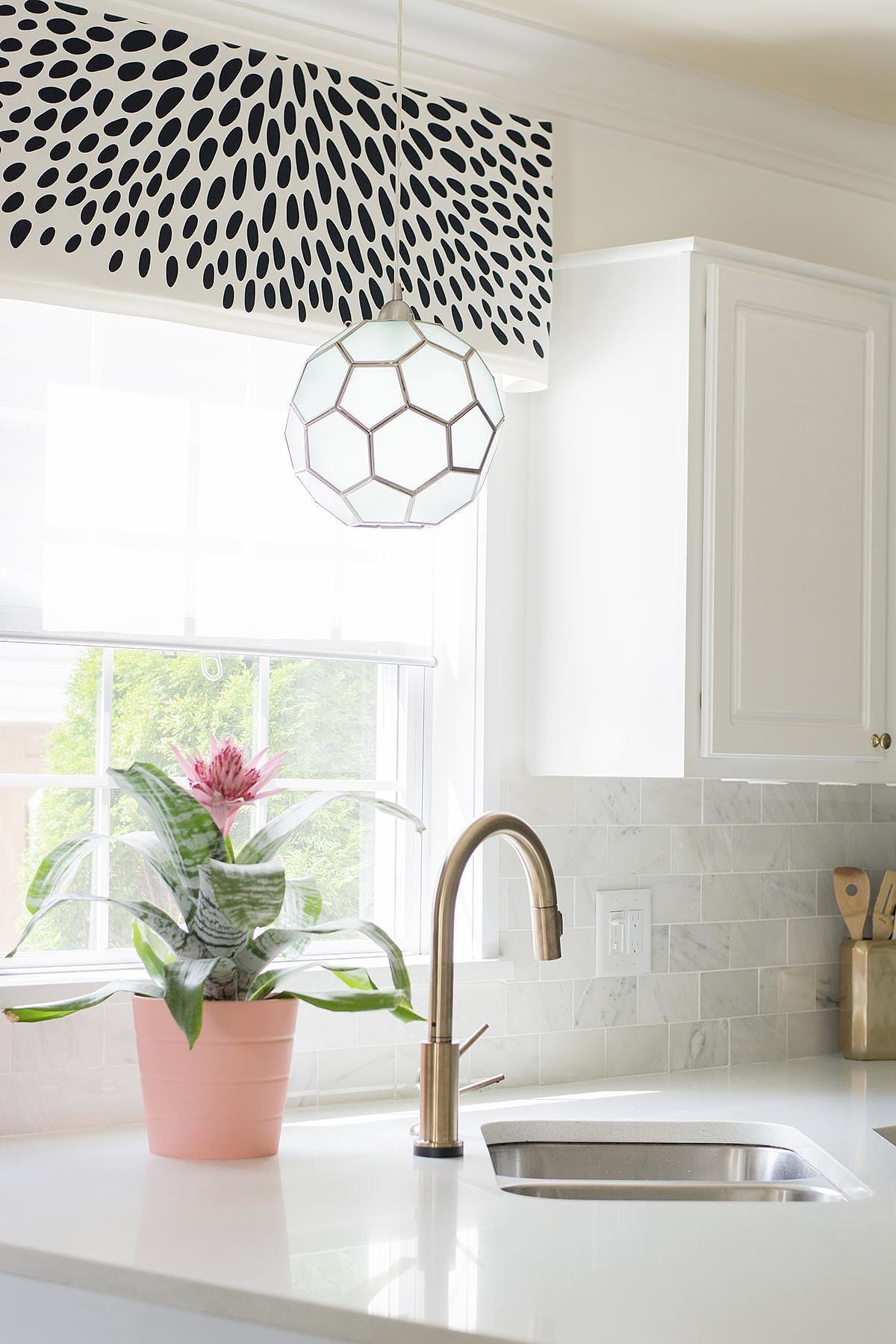
Another creative idea for using quartz in the kitchen is to mix and match different colors or patterns. For example, you can use one type of quartz for the perimeter countertops and another for the island. This approach adds visual interest and helps define different areas of the kitchen. You can also use contrasting edge profiles, such as a thick edge for the island and a thinner, more streamlined edge for the surrounding countertops, to create a dynamic and custom look.
Quartz countertops also offer flexibility in terms of finish. While polished quartz is the most common finish, providing a high-gloss, reflective surface that adds light and elegance to the kitchen, matte or honed finishes are becoming increasingly popular. A honed quartz countertop has a softer, more muted look, with less shine and a velvety texture. This finish works particularly well in kitchens where a more subtle or rustic look is desired. It can help create a more casual, relaxed atmosphere while still maintaining the high-end appeal of quartz.
For those looking for a bold statement, quartz countertops can be the perfect canvas for incorporating unique design elements. For example, a high-contrast countertop with deep veining or bold patterns can serve as the focal point of the kitchen. Pairing these countertops with simple cabinetry and minimal accessories allows the quartz to shine and become the main design feature. Alternatively, a more neutral quartz countertop can serve as a backdrop for other standout elements in the kitchen, such as a bold backsplash or eye-catching light fixtures.

If you’re concerned about sustainability, quartz countertops are also an environmentally friendly choice. Many quartz manufacturers offer eco-friendly options that use recycled materials, such as glass or other post-consumer waste, in the production of the countertops. Additionally, because quartz is an engineered material, it can be made to exact specifications, reducing waste during the manufacturing process. This makes quartz a great choice for those who want to reduce their environmental footprint without sacrificing style or performance.
Quartz countertops also have the advantage of being heat resistant, which is crucial in a kitchen environment. While it’s still recommended to use trivets or hot pads to protect the surface, quartz can handle brief exposure to heat without scorching or cracking. This feature is especially useful near stovetops or ovens, where hot pans and dishes are regularly placed. The heat resistance of quartz gives homeowners peace of mind, knowing that their countertops are both beautiful and functional.
For families with children, quartz countertops can be a particularly good choice due to their durability and ease of maintenance. Because quartz is non-porous and resistant to bacteria, it’s a hygienic surface for food preparation. Spills and messes are easy to wipe up, and there’s no need to worry about kids damaging the countertop with stains or scratches during meal prep or homework time. The low-maintenance nature of quartz makes it a practical and family-friendly option for the kitchen.

One trend that has been gaining popularity is the use of quartz countertops with integrated sinks. This design involves creating a seamless transition between the countertop and sink, with no visible seams or gaps. Integrated sinks provide a sleek and modern look, and they are also highly practical, as there are no crevices for dirt or grime to collect. This creates a clean, continuous surface that is easy to wipe down and maintain.
Quartz countertops can also be used to create a cohesive look throughout the kitchen by extending the material to the backsplash. A quartz backsplash not only adds a sense of continuity and flow to the design but also provides a highly functional and easy-to-clean surface. Unlike traditional tile backsplashes with grout lines that require scrubbing, a quartz backsplash can be wiped down with ease, making it an excellent choice for busy kitchens where cooking and splatters are common.
Finally, when planning your quartz kitchen countertop design, it’s important to consider the edge profile. The edge profile you choose can have a big impact on the overall look and feel of your countertops. Common edge profiles for quartz include the classic straight edge, the beveled edge, and the more ornate ogee edge. Each edge profile brings its aesthetic, so choosing the right one can help enhance the style of your kitchen.
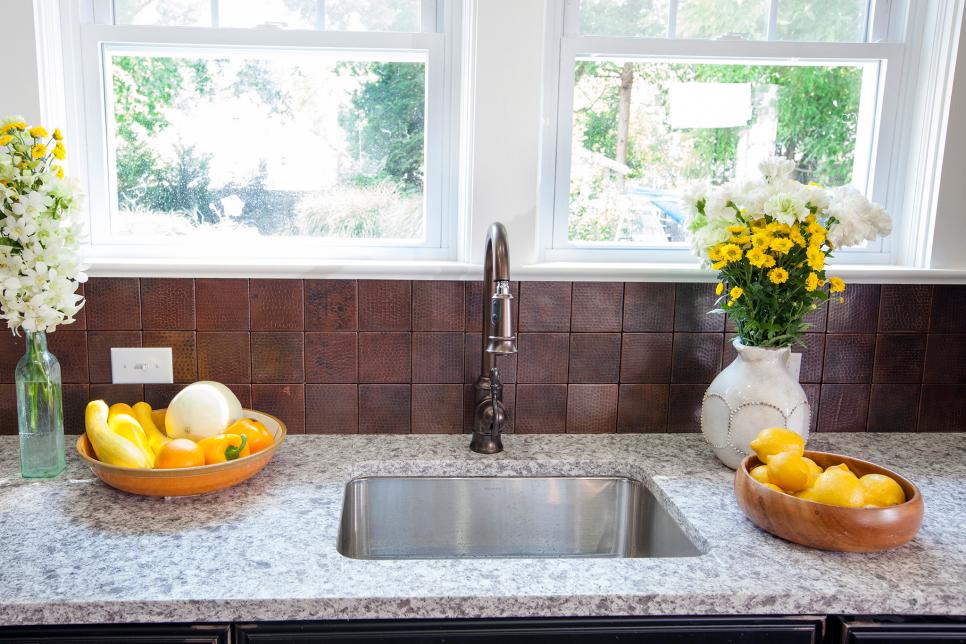
Common Mistakes to Avoid
One common mistake when choosing quartz countertops is assuming that all quartz is created equal. There are different grades of quartz, and lower-quality options may not provide the same level of durability or consistency in pattern. It’s important to choose a reputable manufacturer and ensure that the quartz you select is of high quality.
Another mistake is not considering the thickness of the countertop. Thicker countertops can create a more luxurious look, but they can also increase the cost and weight, which may require additional support during installation. Finally, be mindful of using quartz in outdoor kitchens or areas with direct sunlight, as prolonged exposure to UV rays can cause discoloration over time.

Are quartz countertops durable enough for a busy kitchen?
Absolutely. Quartz countertops are incredibly durable and can withstand the daily wear and tear of a busy kitchen. They are resistant to scratches, stains, and heat, making them a perfect choice for cooking, chopping, and meal preparation. However, using cutting boards and trivets is always a good idea to prolong the life of your countertops.
How do I clean and maintain quartz countertops?
Cleaning quartz countertops is easy due to their non-porous nature. Simply wipe them down with a soft cloth and mild soap and water. Avoid using harsh chemicals, bleach, or abrasive cleaners that could damage the surface. Because quartz is stain-resistant, most spills can be cleaned up without leaving marks, making it a low-maintenance option.
Can quartz countertops withstand heat?
Quartz countertops are heat-resistant but not heat-proof. While they can handle brief exposure to heat, such as placing a hot pan on the surface, it’s best to use trivets or hot pads to avoid potential damage. Prolonged or extreme heat exposure can cause the resin in quartz to discolor or even crack the countertop.

What are the design options available with quartz countertops?
The design options for quartz countertops are virtually endless. You can choose from a wide variety of colors, patterns, and finishes, including options that mimic the look of natural stone like marble or granite. There are also different edge profiles and finishes, like polished or honed, to customize the look to fit your kitchen style.
Is quartz a good choice for eco-conscious homeowners?
Yes, quartz can be an environmentally friendly option. Many manufacturers offer quartz countertops made with recycled materials, reducing the impact on natural resources. Additionally, because quartz is engineered, it results in less waste during production, making it a more sustainable choice than some natural stones.
Can I use quartz countertops outdoors?
While quartz is durable, it’s not recommended for outdoor use. Exposure to direct sunlight and the elements can cause the colors to fade and the resin to break down over time. Quartz is best suited for indoor kitchens, where it can maintain its beauty and durability without being exposed to UV rays or harsh weather conditions.

Kitchen Quartz Countertops Home Design Ideas, Pictures, Remodel and Decor
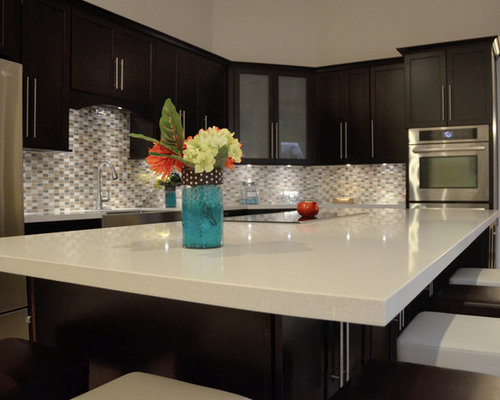
Quartz Kitchen Countertop Ideas

Related Posts:
- Best White Kitchen Countertops
- Free Kitchen Countertop Design Software
- Replacing Kitchen Countertops DIY
- Light Colored Kitchen Countertops
- Pine Kitchen Countertops
- Bedrock Creations Kitchen In A Box Granite Countertops
- Slate Tile Kitchen Countertops
- Brown Kitchen Cabinets White Countertops
- Kitchen Countertop Quotes
- Kitchen Countertop Replacement Price